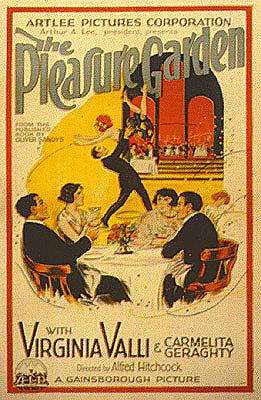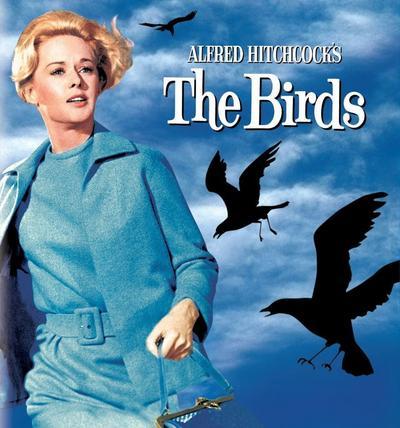A recently divorced woman hides her scandalous past from her new husband and his family.
Read More »
Alfred Hitchcock
-
Alfred Hitchcock – Easy Virtue (1928)
1921-1930Alfred HitchcockDramaSilentUnited Kingdom -
Alfred Hitchcock – The Lady Vanishes (1938)
1931-1940Alfred HitchcockClassicsDramaUnited KingdomQuote:
In this best-loved of Hitchcock’s British-made thrillers, a young woman on a train meets a charming old lady (Dame May Whitty), who promptly disappears. The other passengers deny ever having seen her, leading the young woman to suspect a conspiracy. When she begins investigating, she is drawn into a complex web of mystery and high adventure.If one film challenges the idea that Hitchcock ‘found himself’ as a director only after he arrived in Hollywood, it is The Lady Vanishes. Released in 1938 by Gainsborough, it is arguably the most accomplished, and certainly the wittiest of Hitchcock’s British films, and is up there with the best of his American work.Read More »
-
Alfred Hitchcock – Rebecca (1940)
1931-1940Alfred HitchcockClassicsDramaUSAQuote:
Rebecca is a 1940 psychological/dramatic noir thriller directed by Alfred Hitchcock as his first American project, and his first film produced under his contract with David O. Selznick. The film’s screenplay was an adaptation by Joan Harrison and Robert E. Sherwood from Philip MacDonald and Michael Hogan’s adaptation of Daphne du Maurier’s 1938 novel of the same name, and was produced by Selznick.[1] It stars Laurence Olivier as the aristocratic widower Maxim de Winter, Joan Fontaine as his second wife, and Judith Anderson as the housekeeper, Mrs. Danvers.The film is a gothic tale about the lingering memory of the title character, Maxim de Winter’s dead first wife, which continues to haunt Maxim, his new bride, and Mrs. Danvers. The film won two Academy Awards, including Best Picture out of a total 11 nominations. Olivier, Fontaine and Anderson were all Oscar nominated for their respective roles. Since the introduction of awards for actors in supporting roles, this is the only film named Best Picture that won no other Academy Award for acting, directing or writing.Read More »
-
Alfred Hitchcock – The Birds (1963)
1961-1970Alfred HitchcockClassicsHorrorUSAQuote:
A wealthy San Francisco socialite pursues a potential boyfriend to a small Northern California town that slowly takes a turn for the bizarre when birds of all kinds suddenly begin to attack people.Read More » -
Alfred Hitchcock – Family Plot (1976)
1971-1980Alfred HitchcockMysteryThrillerUSASynopsis:
‘Barbara Harris plays Blanche, a phony psychic, hired by wealthy Julia Rainbird (Cathleen Nesbitt) to trace the whereabouts of her nephew, who’d been given up for adoption years earlier and who is now heir to a fortune. Blanche’s cohort is “investigator” Lumley (Bruce Dern), who is fully prepared to milk the last dollar out of Julia before locating the long-lost nephew. Meanwhile, we are introduced to elegant kidnappers Adamson and Fran (William Devane and Karen Black). The fates of the two couples are inextricably intertwined by the search for the missing heir.’
– Hal Erickson (Rovi)Read More » -
Alfred Hitchcock – The 39 Steps [+commentary] (1935)
1931-1940Alfred HitchcockMysteryThrillerUSAQuote:
Fresh, funny, and filled with typically Hitchcockian suspense, The 39 Steps fully demonstrates the director’s unshaken status as a cinematic master. Based on the 1915 novel by John Buchan, this quickly paced adaptation follows Richard Hannay (played by the sublime Robert Donat) through one dangerous adventure after another and simultaneously tracks his romantic relationship with Pamela (Madeleine Carroll).Like many Hitchcock characters, Hannay is singled out for no apparent reason, wrongly accused of a crime, and caught up in a world of intrigue and danger. It slowly dawns on Hannay that he is among such diabolical forces, and that he must struggle to survive. This scenario often recurs in the director’s work, notably in Strangers on a Train, The Wrong Man, Vertigo, North by Northwest, and The Man Who Knew Too Much (both versions). Through this theme of “the wrong man,” Hitchcock meditates on the issue of human identity and the related issue, in film, of human distinctiveness. He, also through this theme, contemplates what it means to be thrown into the world of a Hitchcock film. Death and exposure to being viewed are among the consequences, or risks, that human beings (characters, actors) face in his universe.Read More »
-
Alfred Hitchcock – The Pleasure Garden [+Extras] (1925)
1921-1930Alfred HitchcockDramaSilentUSA
Quote:
The Pleasure Garden is the first film that Alfred Hitchcock directed to completion. It’s a nice look into the earliest directorial thoughts and techniques of the master. Even in this earliest film, we can see signs of what would become some of his signature trademarks. I enjoyed some of the point of view shots early in the film with the blurred view of the man looking through his monocle as well as the gentleman looking through the binoculars at the show girls legs. There is also a spiral staircase in the opening of this movie. Not that it was used like the staircase in Vertigo, but it made me smile thinking of how important that would be in his later film. The story deals with the idea of infidelity. Jill (Carmelita Geraghty) is an aspiring dancer who gets engaged to Hugh (John Stuart) who has to leave for work overseas. Patsy (Virginia Valli), who has helped Jill get her start, starts to worry about Jill keeping her promise to wait for Hugh. Jill’s career is taking off and she begins to fool around with other guys. Patsy marries Levett (Miles Mander), Hugh’s friend who also goes overseas to work with Hugh. Unlike Jill, Patsy remains true to her husband, thinking only of being with him. She receives a letter that her husband has taken ill and scrapes up the money to go be with her husband in his time of need. When she arrives, she finds that he has taken to drinking and island women. That’s when the trouble ensues. I enjoyed Hitch’s first film. It’s a little slow starting, but picks up pace as it goes along. I liked seeing Cuddles, the dog, thrown in for a little comic relief to contrast the seriousness of the film, which of course is another of Hitchcock’s trademarks. There was also a nice, subtle score by Lee Erwin, that fit the film well.Read More » -
Alfred Hitchcock – The Farmer’s Wife (129m version) (1928)
1921-1930Alfred HitchcockComedyDramaUSAFarmer Sweetland is a lonely old widower. He is determined to marry again and he enlists the help of his housekeeper Minta to pick a wife from the local single women.Read More »
-
Alfred Hitchcock – Under Capricorn (1949)
1941-1950Alfred HitchcockDramaThrillerUSAQuote:
Although John Colton’s and Margaret Linden’s onscreen credit reads “by”, they had actually written an unproduced and unpublished play based on Helen Simpson’s novel. The novel was adapted for the screen by Hume Cronyn and was the basis for the screenplay. In this film, Alfred Hitchcock continued to experiment with long takes, a technique that he began in Rope, which was also adapted by Cronyn. Ingrid Bergman’s monologue, during which she relates the story of her marriage to “Flusky,” the subsequent shooting of her brother and their experiences in Australia, lasts nine and one-half minutes and was shot in one take. A dinner table sequence runs more than seven minutes without a cut. Most of the picture was filmed in London and the English countryside, according to an October 11, 1948 news item in Hollywood Reporter, but some scenes were shot on the Warner Ranch in Calabasas, CA. On August 26, 1948, Hollywood Reporter reported that Hugh Reticker would be the art director on the film when the production returned to the United States, but the extent of his contribution is undetermined.Read More »







